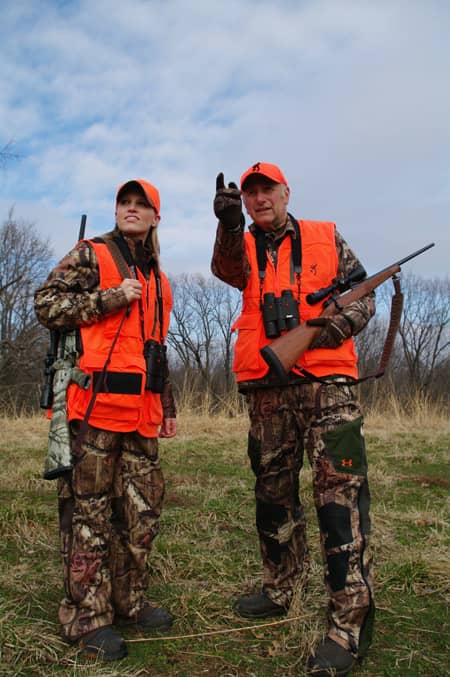How Can Hunter Education Help Create More Safe Hunters?
Hunter-ed 04.10.12

Findings from a 2011/2012 hunter education study conducted by Responsive Management suggest that fine-tuning current hunter education programs could bolster numbers of licensed hunters.
“To capitalize on peak interest, state natural resource agencies should provide information on mentored hunting opportunities as well as maps of public hunting lands during hunter education courses or immediately following them,” said Mark Duda, executive director of Responsive Management. “Agencies that consolidate post-course information such as season dates, hunting regulations, special hunt opportunities and other information could make it easier for graduates to take that next step.”
The purpose of the study was to assess the best ways of encouraging hunter education graduates to become regular hunters and license buyers. The study included focus groups and pre- and post-hunter education course telephone surveys of students in Alabama, Georgia and Kentucky.
The study revealed that between 85 percent and 94 percent of hunter education students across the three states said they were very likely to obtain a hunting license after their course. However, post-course results indicated between 53 percent and 70 percent of hunter education students who had never hunted or possessed a license before bought a license after the course.
As a way to boost the percentage of students who buy a hunting license, Duda suggested that state agencies responsible for hunter education explore ways to immediately get a hunting license into the hands of course graduates. Doing that would mean hunter education graduates would face one less barrier to active hunting participation.
“One way of accomplishing that would be to include the fee of an annual hunting license in the overall price of course registration, thereby guaranteeing that students leave the course fully licensed to hunt in their state,” Duda said.
Other suggestions to increase the number of hunter education graduates who purchase hunting licenses is offering optional follow-up courses. Seminars or distance-learning options could be an additional source of revenue for agencies as well as provide new hunters with more information on topics such as scouting, hunting strategies or field dressing game.
Providing more classroom courses was mentioned by study participants as another improvement. Notable percentages of survey respondents in Georgia (12 percent) and Kentucky (34 percent) said courses were overcrowded or not easy to find close to where they live.
State-approved online hunter education courses, such as the one offered at www.hunter-ed.com, can provide a high-quality and convenient alternative for students. It’s also good news for conservation funding because an analysis of the survey results showed that, in general, online hunter education students were more likely than classroom students to purchase a license for the 2011-12 season.
Most states also require hunter education graduates to attend a field day where students may be required to demonstrate safe firearms handling and/or take a test. While field days weren’t considered in this study, anecdotal evidence suggests field days also are difficult to find, especially since many hunters want to finalize their certification just before spring and fall seasons open. Online training can free up volunteer instructor time making them available to host more field days.
The Responsive Management study results also showed that hunter education graduates are open to the idea of receiving emails that offer key hunting information. Agencies that develop a mailing list can remain in contact with course graduates and target them with opportunities, events, and news items throughout the year.
How can an agency easily build and manage that type of mailing list? One way is through Event Manager, Kalkomey’s new web-based registration and event management application. Event Manager gives agencies a powerful tool that allows students to sign up for classroom and field day courses online. The agency can then retrieve this data to provide news and information especially directed to hunter education graduates. Plus, Event Manager streamlines the entire registration, grading/recording, and event reporting process for students, instructors, and agency administrators.
A companion product, Certification Manager, will allow agencies to safely store data so it’s always at administrators’ fingertips whether they need to search, edit, report on or export student data as well as issue replacement certification cards. Certification Manager is expected to be available later this year.
Hunter education has long been applauded for creating safer hunters. This study shows that subtle changes in the program also can make a big difference when it comes to turning course graduates into license-buying hunters.
About the Study:
Responsive Management, a public opinion and attitude survey research firm specializing in natural resource and outdoor recreation issues, conducted the study on behalf of the National Shooting Sports Foundation with the cooperation of the Georgia Department of Natural Resources, the Alabama Department of Conservation and Natural Resources, and the Kentucky Department of Fish and Wildlife Resources.

